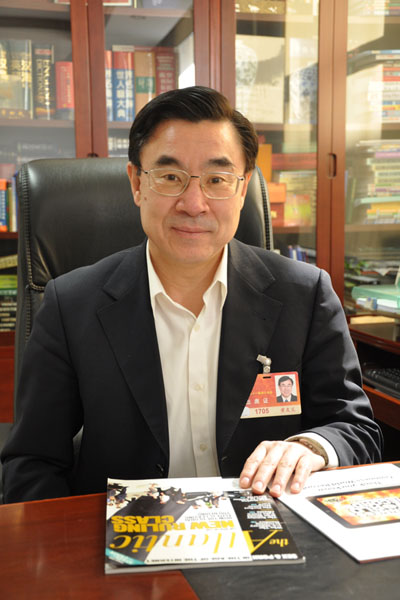Translation contest to stimulate interest in Chinese
- By Wu Jin
 0 Comment(s)
0 Comment(s) Print
Print E-mail China.org.cn, September 2, 2013
E-mail China.org.cn, September 2, 2013
The China International Translation Contest 2013 (CITC) opened on September 2 to stimulate foreigners' interest in learning Chinese. In an interview with china.org.cn, Huang Youyi, Vice President of China International Publishing Group and Secretary General of the Translators Association of China, explained the purposes of holding the contest, which is now open for applications.
 |
|
Huang Youyi, Vice President of China International Publishing Group and Secretary General of the Translators Association of China |
China.org.cn: Why have you asked contestants to translate literary works?
Huang Youyi: Literary works best reflect the culture of a country. To translate literary works is a difficult task, therefore it is the best way to gauge a translator's abilities..
China.org.cn: Can you describe the state of the Chinese literary translation market?
Huang: The awarding of the Nobel literature prize to Mo Yan was a watershed for Chinese literary translation. The popularity of Chinese literature varies in different countries. For example, Chinese literature has been welcomed in France but neglected in the U.S. This is mainly because the American people prefer to read original rather than translated works. When Mo Yan won the Nobel Prize, it showed the significance of Chinese writers. Chinese literature then started to become commercialized and expand into overseas markets.
China.org.cn: Why do the works for this translation contest mainly come from the writers born in the 1950s and 1960s?
Huang: Our focus is on contemporary literature rather than 4,000 year old classics. To translate the classics, you need a sound knowledge of history. But what we are testing this time is people’s understanding of modern China. We have not really included writers born in the 1970s and 1980s, because they are not as famous as their predecessors. They may be included in the future contests. We will expand the topics by incorporating essays and poems in the future.
China.org.cn: You once said that it is wrong to translate literature into a foreign language. Why have you chosen to promote a "wrong choice" on this occasion?
Huang: Translation is universally recognized as difficult. But the situation in China is unique, because we have a very small number of Chinese learners and sinologists who can translate Chinese into other languages with complete accuracy. China is also a huge country with a rich culture. We need to introduce our politics and economics to those who want to invest in the different regions of the country. Therefore, we now have a large pool of translators who are able to translate the native language into foreign languages. To encourage as many as possible to learn Chinese, we have included in this contest all the languages used in the United Nations.
China.org.cn: How will you assess the translated works based on the criteria of "accuracy, fluency and elegance"? What restrictions are placed on contestants?
Huang: The judging of this contest will focus more on "accuracy." In other words, it will test whether the translator understands Chinese culture, for example the young people who went to the countryside during the Cultural Revolution (1966-1976), the movement to eliminate illiteracy and the reform and opening up. Accuracy proves a translator’s understanding of the original Chinese. A good translator would surely to resort to native speakers [when they encounter obstacles]. I think most foreign translators have no problem in "fluency", but it would be better if they could make their works look elegant.
The contest focuses on stimulating the interest of foreigners in learning about Chinese culture. Overseas contestants are welcomed. We hope the [contest] will help more young translators [to improve their skills]. We may also publish books containing translated works from the prize winners. We also welcome Chinese translators who are interested in the project. They can find a foreigner to polish their translation and submit the translation with both of their names on.






Go to Forum >>0 Comment(s)